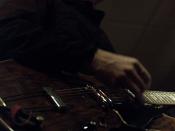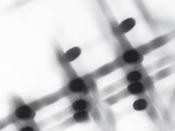The actions and reactions of Gregor's sister are another instance of human and inhuman conflict. This is particularly shown in the first days of Gregor's change while his sister is learning how and what to feed him. In her first attempt she leaves out a large bowl of milk, which used to be his favorite drink. However, after his transformation he can no longer stand the taste and leaves the bowl full. Very early the next morning his sister returns to see if he has finished it. As she slowly opens the door and peers in she catches sight of him under the couch and slams the door immediately. After a moment she opens it again and comes ""æin on tiptoe, as if she were visiting an invalid or even a stranger" (Kafka, 172). In this moment she is treating Gregor in a very inhuman way. She acts like this because his appearance scares her.
She knows inside it is her human brother, but she can't help acting as if it is not. Her treatment of Gregor shifts to a more human interaction when she realizes the bowl of milk has barely been touched. She takes the milk away and comes back from the kitchen with a large bowl of water and an assortment of food for him to choose from. After placing it on the ground, nicely separated, she leaves to give him privacy. In this situation she is acting very sisterly, as if she now looks at him as her brother and not some unknown creature. It is much like the way a sister would take care of their sick brother. A while later she returns to clean up after him. She begins "sweeping together with a broom not only the remains of what he had eaten but even the things he had not touched, as if these were now of no use to anyone"æ" (Kafka 172). Here she is back to treating him very inhumanly. Both the fact that she is unwilling to touch any of the food with her hands and that she throws away things which Gregor did not even touch are similar to how you might clean up after feeding your pet. However, she seems to be the only member of the Samsa family who is able to look past Gregor's changes and still treat him with at least an ounce of humanity. In almost every situation involving Gregor's sister we see her jump back and forth between the human and inhuman treatment of Gregor.
Another example of this is when Gregor's sister comes twice a day to tidy his room. Even though many of Gregor's new characteristics make her treat him in inhuman ways there is always the recognition that it is her brother. She always ""ætried to make as light as possible of whatever was disagreeable in her task" (Kafka (177). When she comes in his room the first thing she does is open a window, because she can't stand the smell of him. Kafka writes, "Hardly was she in the room when she rushed to the window, without even taking time to shut the door"æ" (Kafka 177). However, opening the window isn't all to her comfort. She would often have to stand there "in the open draught"æ even in the bitterest cold" (Kafka 177). Her intense unwillingness to bare the animalistic smell of Gregor, and her willingness to tolerate the freezing cold to take care of him are, respectively, inhuman and human ways in which she treats her brother.
On another occasion she enters Gregor's room and sees him sitting in a chair by the window. She is horrified by the sight of him, runs out, and doesn't return until much later in the day. When she does finally return Gregor has covered himself with a sheet to spare her the sight, for which "he caught a thankful glance from her eye" (Kafka 177). Even though his sister cannot stand the smell or sight of her brother she still views him as her brother. She takes care of him regardless of his inhumanness and regardless of her inclination to treat him so.
Another situation described in the story is when Gregor's mother deeply yearns to visit her son. Her desire and concern for her son is clear when she cries: "Do let me in to Gregor, he is my unfortunate son! Can't you understand that I must go to him?" (Kafka 178). Mrs. Samsa's plea to visit her son leads us to believe that she still firmly considers Gregor is indeed her son. She appears sympathetic and willing to put aside his metamorphosis because she is aware he needs her love and support. She appears to take into consideration his needs as a human. She also worries that Gregor will begin to think that they've given up hope, and left him to live his life in solitude. On the contrary, whenever Mrs. Samsa enters Gregors room, she is hesitant and loses all enthusiasm. She is repulsed at his very sight, and even faints. Mrs. Samsa's actions then lead us to believe that she is intimidated and disgusted with Gregor's nature. His bug-like appearance cannot be put aside or tolerated. His discouragement, when being left to himself, isn't relevant to her. He is indeed an insect, incapable of receiving affection from his family.
Another debatable element in the story is when Mrs. Samsa determines that she is uneasy with Gregors possessions being removed from the room, so therefore Gregor would indeed feel the same way. Kafka states, "the sight of the naked walls made her own heart heavy, and why shouldn't Gregor have the same feeling" (Kafka 179). The fact that she is comparing Gregor's thoughts and feelings to her own human feelings displays the idea that Gregor is undeniably human. Yet, the narrator immediately goes on to say that Mrs. Samsa is convinced that Gregor cannot understand her words while she was talking to Grete. This evidence then leads us to believe that Gregor possesses the non-human characteristics of an insect and can by no means interpret the human language. Therefore, Gregor's state is unclear as he could think like a human, yet posses the qualities of a bug.
This concept of human vs. non-human is also presented when Gregor debates if it would be better to keep the family's old furniture in his room, or have it removed. His thoughts provoke the thinking characteristics of both an insect, and a human. He ponders the idea that removing the furniture would enhance his ease at crawling around in all directions. However, he then considers the fact that removing the furniture would cost him a price; "the price of shedding simultaneously all recollection of his human background" (Kafka 180). Gregor's indecisive human vs. no-human characteristics reflects in his mother's actions in this situation. When Grete concludes, only to oppose the ideas oh her mother, that it would be best to remove all the furniture from Gregor's room, Gregor's mother makes no attempt to stand up for what she believes is best for Gregor; leaving Gregor's furniture in his room. Rather, she ignores her own good intentions and begins to assist Grete in the removal of Gregor's furniture. Her actions in this situation reflect a non-human behavior as she puts aside what she believes is best for her son. If she truly wanted to ensure her son's well being, she would have argued with Grete's decision and left the furniture alone. Yet, Mrs. Samsa is acting in a very human nature as she is letting her spoiled daughter get her way. In stead of setting Grete straight with what should be done, she is apprehensive and is just trying to avoid an argument with her daughter; something parents may do at times.
Last of all, Gregor's father created a debatable perception of Gregor. When his father becomes furious, he bombards Gregor with apples as if Gregor were a threatening beast. He also attempts to squash Gregor with the sole of his shoe, an action typically done to a bug. His father's actions imply that Gregor is perceived as a non-human character, subject to attack by those around him. Yet, after Mr. Samsa injures Gregor in a non-humane fashion, he seems to recognize Gregor's status as his son. Mr. Samsa's recognition is evident when the narrator states: " the serious injury done to Gregor ["æ] seemed to have made even his father recollect that Gregor was a member of the family, despite his present unfortunate and repulsive state, and ought not to be treated as an enemy" (Kafka 185). This is an exemplary situation where the pivotal debate of human vs. non-human is presented. Mr. Samsa's actions are of those done to a bug, beast, or anything of a non-human nature. However, he then distinguishes Gregor as a member of the family and discussed how family duty requires him to be patient with his son.





